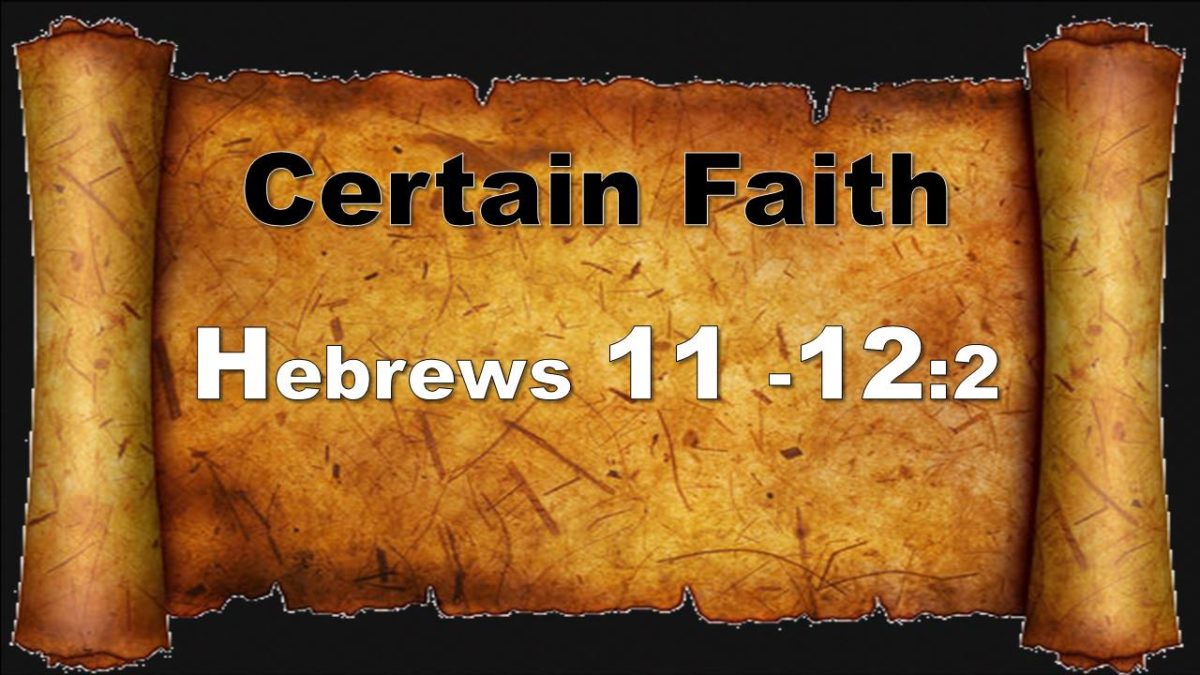“Free advice,” the sign read. These were my student days. I was biking around our inner-city lake were I used to exercise, and there he sat—a man next to the bike path, comfortable, in his lawn chair and with his sign.
Not able to pass up a curious encounter, I stopped but didn’t get off my bike.
“Totally free?” I asked.
“No charge,” he answered.
“All right,” I said, thinking what I could ask. “I’m considering getting married. What should I do?”
“Do it!!” the man offered, with great enthusiasm, and for free.
“Right on!” I said and went back to riding.
While at that juncture in my life I don’t think I even had a girlfriend, the encounter had just confirmed one thing: faith is only as good as good as the object (or person) in whom it is placed. Lawn chair guy and his advice wasn’t going to change my life.
This summer at Woodland we’ve considered a number of the Old Testament historical figures we meet in Hebrews 11. While few followed God without fault, all of them trusted God with a kind of faith God finds acceptable.
Faith God accepts embraces God’s real but invisible plan (11). This faith, we learn, involves confidence that comes from trusting in what is true. I like the NIV translation of verse 1: Now faith is being sure of what we hope for and certain of what we do not see. Such faith operates like a kind of spiritual vision that helps us rest in what our eyes can’t see, possibly (like with Old Testament figures) because it hasn’t happened yet.
God accepted the faith of those who lived before Christ, even though He hadn’t revealed His entire plan. For by it the people of old received their commendation from God (11.2, ESV). They trusted in the God of Promise based on what He told them would happen, and this pleased God. Abel offered a better sacrifice than Cain, by faith. Enoch lived in obedience as one who walks with God, by faith. Noah believed when nobody else did, by faith. Abraham offered Isaac, by faith, believing God would raise him. Moses passed on the riches of Egypt to see God, by faith … God accepted their faith because they placed their trust in the right object.
But, what was that object, really?
Verses 39-40 close the loop in Hebrews 11: And all these, though commended through their faith, did not receive what was promised, since God had provided something better for us, that apart from us they should not be made perfect.
Each of these Old Testament saints died with their heart’s desire yet unfulfilled, because God hadn’t finished His plan yet. God hadn’t finished His plan yet, because He wanted to include us. And what was God’s plan? It was to provide a Redeemer. Those whom God accepted in the Old Testament were saved by faith in a Redeemer who would come! These were saved not on the basis of the intensity of their faith but because of the One they believed in. Jesus was the object of their faith!
Faith God accepts embraces Jesus and endures in dependance on Him (12.1-2). So, we come to chapter 12 which is really an application for those of us who live after the cross. We’re to run with this “cloud of witnesses” before us. We’re to run putting away sin and impediments that distract. But, most of all, we’re to ” … run with endurance the race that is before us” (12.1b).
This is a reminder that the Christian life is a life of endurance. And, how do we endure? By looking to Jesus (12.2a). Jesus is the “pioneer” of our faith. Jesus is the completion of everything God is doing. Jesus endured the cross, because He wanted to please God. Jesus is sitting at the Father’s right hand. Jesus is the One we’re to look to while we respond to the circumstances God has allowed into our lives (the “race” or “course,” verse 1b).
The “race” has been particularly hard here at Woodland this past week. Floods in the southern part of the state stranded one Woodlander in a hotel as she was driving home from work. A three-year-old fractured his leg. Cancer is among us in the Westboro-Rib Lake community. (Three situations come immediately to mind.) And, one of our own at Woodland is presently at the Mayo Clinic having been diagnosed with Mantle Cell Lymphoma on Monday.
All of this calls us to think carefully about our faith in the object of One who is worthy. We’ll need to learn to depend on God and His plan and live the life of faith together, especially since we can’t see everything God is doing right away.
Mostly, we’ll need to look to Jesus, whom the Ancients longed for, but whom we know. This is what our summer study has prepared us for. Would that we go forward into the school year ready to endure with joy.
Faith God accepts embraces Jesus and endures in dependance on Him.
How has trusting Jesus helped you endure in your “race”? It’s a personal question, but sharing encourages others. Why not hit the “comments” field at the top left of this article and encourage us with your story?
And have a great week in the LORD.




